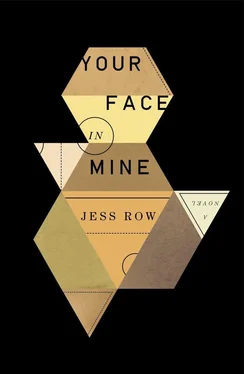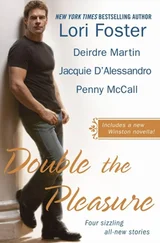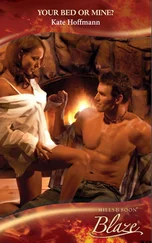Not until the water taxi has rolled away from the pier, the thrum of the engine vibrating the balls of my feet, not until we’ve muscled past two long-tailed boats, thin as barracudas, and the hot brackish wind from the river has caught me full in the face, can I look over my shoulder and say for certain, certifiably, that I’m being followed.
It’s ridiculous, the phrase, the whole idea, I’ve been telling myself that all day, as I shuffled along with the columns of tourists at Wat Phra Keow, the Temple of the Emerald Buddha, which even I could recognize was the Disneyland of Thai temples — every tile and mosaic buffed and shining, every ornament dripping with ornament, the grass poison-green, security guards glaring straight ahead every few feet. It was a young kid in an orange-and-white polo shirt, who tried and failed to be inconspicuous, turning every corner just behind me, not more than twenty feet away, and who stared frankly at me every second, as if fearing I would disappear before his eyes. Later I sat for forty-five minutes in a massage chair at Wat Po, the Temple of the Reclining Buddha, and when I opened my eyes at the end I thought I’d imagined the whole thing, or maybe he was a young hustler, or just some crazy teenager following me on a whim. But as I left the temple gate and crossed two blocks, almost tottering in the heat, following the map in a Lonely Planet Tariko lent me, looking for a vegetarian café he’d highly recommended, a man on a motorbike kept pace with me, sidling through the crowds of elderly Japanese ladies with floral handbags, the groups of Chinese all wearing the same ill-fitting red mesh baseball caps printed, in gold, Empire West . He wore the absurdly tight brown uniform all Bangkok police wear, with gold aviator glasses, but the bike was unmarked. At the café I took a seat in the window, and ate an excellent papaya salad and Massaman curry with tofu, keeping watch. Nothing. Of course, I thought, reeling back through every detective novel I’d ever read, every episode of Law & Order or Magnum P.I., if the target is in a home or a business you don’t have to park out front, only somewhere with a clear view of the entrance, unless the target is savvy enough to find a back door. In which case you have to have two followers anyway, guarding each exit.
I had my Thai cell phone there on the table, next to the Lonely Planet ; I could call Tariko, or get into a cab and head back to the house. Should I be afraid, I wondered, actually? And who of?
Who else, other than Martin?
It would be convenient to have a person vanish in the middle of Bangkok. Probably there’s few places in the world with more opportunities to disappear. You could go to Patpong and have a prostitute slip you a little GHB, and the next thing you know you’re decomposing in a field on the road to Ayuthaya while she empties your bank accounts. You could get on a bus for Phnom Penh or Chiang Rai or Vientiane and leave in the middle of the night. If I went missing, I thought, who would look for me? The night before leaving I’d emailed my parents my flight receipt, telling them I was on a reporting trip for a book project with no definite return date. They don’t expect regular phone calls or emails; it might be a month before they started looking in earnest.
Have I become that much of a liability?
Because of that additional five percent?
Because I’m a competitor? Another story, another celebrity? B ecoming Chinese: If You Can’t Beat Them, Join Them: An American Leaves Home to Join the World’s Newest Superpower: Chinese from the Inside Out.
Because he thinks he’s doing me a favor. Before I become the tragic mulatto.
Because I’m the last one on earth who knows his real story. Who can pin him to a map.
Thinking this way was so ridiculous I flushed, the hairs prickling on my arms.
But then why would he have them follow me? Don’t these things depend on the element of surprise, the bag over the head, the hustling into the unmarked van? Wouldn’t they be more likely to send someone as bait? Like in The Crying Game . Forest Whitaker, the black soldier from Tottenham, snogging with Miranda Richardson in a muddy field at an Irish country fair, when Stephen Rea puts a gun to his head. Miranda Richardson, killed in a skiing accident just a few years ago, an untreated head wound, only in her fifties.
No, that was Natasha Richardson.
This is my last day on earth as Kelly Thorndike, I thought, the last day in my own skin, as the person my parents made, my grace period, and I’m inventing surreal murder plots and misremembering old movies. Shouldn’t this be a sign of something? I ought to be in a panic. Shouldn’t I run home, in a defensive posture? I ought to be missing my Rice Krispies about now. My neat and orderly life, my books and furniture, my desk, the clean-swept hardwood floor where I can pad about barefoot and listen to the police sirens streaking down St. Paul knowing they’re not coming for me. Baltimore. Home. But no. I didn’t want any of it. I’ve broken the spell, I thought, I’m free.
You want anything else?
The kind-faced young waiter in a Greenpeace T-shirt scooped up my dishes with one hand and refilled my water glass with the other.
Give me a recommendation, I said. I’ve seen the temples. What should I do now?
Take a river taxi, he said. You won’t regret it. Best thing for a day as hot as this.
—
The man in the gold glasses and brown uniform followed me onto the boat, ten paces behind, never glancing my way, talking on his phone the entire time. An ordinary preoccupied commuter. Now he’s taken a position on a bench next to the gangway. Alarm, alarm. A well of panic into which anything can fall without making a sound. I’m going to be leaving this life before it’s even begun. I turn away and pretend to study the enormous white cone of Wat Arun, just coming into view on the far side of the river.
Or — it occurs to me just now — maybe he’s simply having me followed. To make sure I don’t stray. No surreptitious emails, no long phone calls, no meetings with clandestine publishing agents. Why does that seem, if anything, even less believable? Of course he would consider it. I would, too. Given our history, who would believe in such a thing as absolute trust? I should call him just to confirm. In an easy tone. Hey, Martin, about that guy watching me—
Two heavy fingers rest on my shoulder.
You Kelly? he asks when I turn around. He’s removed his glasses and stares at me with puffy eyes, the lids swollen like inchworms. Kelly from USA? My name San.
I have no idea what to say to this, so I nod.
Somebody want to see you, San says. You know. You know him. Follow me, please. We get off next stop.
—
We’re in the tourist quarter. Khao San Road, where the trustafarians play. Streaming past me are muddy-faced white girls done up in braids and beads, batik skirts and jingling anklets; twenty-something boys in Beerlao and ManU and Che T-shirts; towering Aussies with splotchy sunburns gnawing kebabs and spooning pad thai out of paper cups. San threads me through the middle of the street, dodging tuk-tuk drivers and travel agents offering flyers, strolling ukulele players and kickboxers giving impromptu demonstrations. We turn two corners, all the sidewalks packed with pink faces, puffed out by heat and alcohol. Down an alley lined with sidewalk cafés and massage chairs, and under a hotel canopy— Hotel Santana —into deep, pungent shade. Sticky cocktails, cigarette smoke, spilled beer and fish sauce. On the back wall The Notebook plays on an eight-foot screen with the volume turned down, a close-up of Ryan Gosling’s puppy-dog eyes.
Читать дальше












